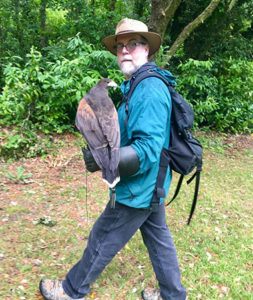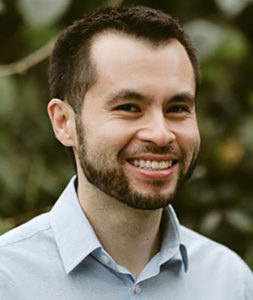APS Spotlight
Cattell Fund Projects Include Research on Children’s Executive Function, Empathy Choice, and More

The James McKeen Cattell Fund has recognized APS Fellow Stephanie M. Carlson, C. Daryl Cameron, Robert Hampton, and Kevin Holmes as recipients of its Sabbatical Fund Fellowship for 2023–2024. Administered through the James McKeen Cattell Fund, these awards (distinct from the APS James McKeen Cattell Fellow Award) help recipients pursue new research by supplementing the regular sabbatical allowance provided by their home institutions so they can extend their leave time from 1 to 2 semesters. During that time, the researchers plan to pursue the research projects outlined below.
Learn more about the James McKeen Cattell Fund, including past sabbatical awardees and how to apply for the 2024–2025 award (application deadline January 15, 2024). Read about the 2022–2023 sabbatical awardees.

C. Daryl Cameron
Penn State University
My research at the Empathy & Moral Psychology (EMP) Lab focuses on motivational factors that shape people’s choices to empathize and to cultivate social emotions such as compassion and moral outrage. Our lab draws upon training and methods in affective science and social cognition, and is heavily interdisciplinary, including collaborations with moral philosophers. We have studied why people sometimes show less empathy in response to mass suffering, and why people engage in dehumanization (i.e., reduced mental state attribution) for stigmatized groups. One theme from my lab’s research over the years is that reductions in empathy can sometimes be due to people strategically regulating empathetic feelings because of anticipated costs and benefits, rather than due to intrinsic limitations on empathy itself (for a recent review, see Cameron et al., 2022, in Advances in Experimental Social Psychology). Some of this work interfaces with normative arguments against empathy as a guide for moral life — if empathy gaps are driven by motivated choices, then such findings could reframe how we think about the ethical implications of empathy.
In recent years, we have extended our motivated empathy regulation approach to develop a new measure of propensities to empathize, by assessing people’s free choices to empathize or remain detached from others using the empathy selection task (see Cameron et al., 2019, JEP: General). In our work, we tend to see that people choose to avoid empathy for strangers, which often associates with the perception that sharing in others’ experiences is cognitively effortful and difficult. We have built upon this work to understand how perceptions of effort and fatigue may relate to choices to engage in compassion and to cultivate moral outrage. We have also examined how empathy choice plays out in relevant applied populations (physicians, patients with brain lesions) and for novel targets (non-human animals), and how such choices can change due to motivational interventions such as financial incentives and relationship ties. I’m particularly excited by my graduate students’ developments here, extending our group’s work to understand how empathy can be used creatively and how we think about our own and others’ moral circles.
During this sabbatical year, I will be using the time afforded by the Cattell Fellowship in several ways. First, I will be continuing to develop my lab’s work on motivated empathy regulation, focusing on how people choose to empathize or disengage from different social targets. We have been exploring motivated empathic choices in several socially important contexts — including how we interact with robots and AI, how we choose empathy in response to Covid-19 victims, how we navigate politically polarized environments, how we consider the suffering and experiences of animals, and how we respond to depictions of systemic social disparities. Second, I’m also a faculty member in the Rock Ethics Institute (both as a co-funded Senior Research Associate, and more recently as a Sherwin Early Career Professor for 2023-2026), and have recently launched the Consortium on Moral Decision-Making. The goal of the Consortium (details here: https://ssri.psu.edu/news/new-consortium-focus-moral-and-ethical-decision-making) is to bring together faculty and students from across the social sciences and humanities, both internal and external to Penn State, to develop interdisciplinary projects on moral and ethical decision-making. Given how broad and complex human morality is as a topic, our hope is to leverage the unique methodological insights of different disciplines to provide more robust and widely impactful projects that will address many of the issues noted above, such as political polarization, human-technology interactions, and moral emotions in conflict situations. The Cattell Fellowship will allow me to network and build interdisciplinary connections with colleagues elsewhere (such as moral philosophers and psychologists at Duke, University of North Carolina, and Cornell) who have experience in cultivating rich interdisciplinary morality networks. I look forward to continuing to develop the Consortium through outreach events such as the Expanding Empathy Speaker Series, which I have run for five years at Penn State (the talks are archived here, and to building the vitality and strength of this network moving forward.
References
Cameron, C. D., Hutcherson, C. A., Ferguson, A. M., Scheffer, J. A., Hadjiandreou, E., & Inzlicht, M. (2019). Empathy is hard work: People choose to avoid empathy because of its cognitive costs. Journal of Experimental Psychology. General, 148(6), 962–976. https://doi.org/10.1037/xge0000595
Cameron, C.D., Scheffer, J.A., Hadjiandreou, E., Anderson, S. (2022). Motivated empathic choices. Advances in Experimental Social Psychology, 66, 191–279. 10.1016/bs.aesp.2022.04.005

Stephanie M. Carlson
University of Minnesota
Many personal and societal problems have roots in deficient self-control. The neuro–cognitive basis of self-control is known as executive function (EF), which includes skills such as remembering goals, controlling impulses, and thinking flexibly. For the past 25 years, I have worked to understand the origins, development, and remediation of EF skills in early childhood. During this time, the field has exploded, in part with support from measures I have developed in collaboration with my students and colleagues. Findings have reinforced the significance of EF as a foundation of cognitive and social development and a predictor of key life outcomes. Yet many new questions have been raised and much remains to be learned.
With generous support from the James McKeen Cattell Sabbatical Fund, I plan to accomplish two goals. First, I aim to write an updated comprehensive review paper on EF measures for children. The review will highlight best practices and offer guidelines on how to measure children’s EF if you are a researcher, clinician, educator, or even a parent. I wrote a paper on measures of EF in 2005, which continues to be highly cited, but it will soon be 20 years old and much has happened since. The updated review will extend from infancy through adolescence, given the rising number of multi–site longitudinal studies of EF that would benefit from repeated measures across a wider age range. It also will expand beyond laboratory measures, given recent calls for highly portable and ecologically valid measures that can be administered in multiple settings. My hope is that the review will catalyze more inclusive research on this vitally important topic in psychology.
Read all of the articles from the November/December Observer.
Second, I plan to submit a grant proposal to further my new direction of research utilizing imagination to improve children’s EF and prosocial behavior. I will be a Visiting Scholar at Harvard University, where I will benefit from interactions with Professor Paul Harris in the Graduate School of Education, as well as the thriving community of developmental scientists. I have had an enduring interest in pretend play and imagination since my first publication under the mentorship of developmental psychologist Marjorie Taylor on children’s imaginary companions. In recent years, my students and colleagues and I have investigated the intersection of EF and imagination in the preschool period, namely, how we might leverage children’s natural proclivity to pretend in the service of improving their self-control. We found that psychological distance — taking a mental step back from the exigencies of the current situation — helps young children be more reflective and perform better on EF measures. A series of studies focused on social distancing, that is, imagining a difficult situation as if you were someone else (the “Batman Effect”). Currently, I am examining the effectiveness of a different form of psychological distancing — temporal distancing — in which children are guided to use their imagination to imagine their future selves. With funding from the University of Minnesota, my lab recently found that encouraging 4-year-olds to imagine their future selves using storyboard props increased their saving (reduced their impulsive spending) of limited resources. The next phase in this research program seeks to expand the range of outcomes studied, such as sharing of limited resources with others. Funding from the Cattell Sabbatical Fund during my year at Harvard University will allow me to achieve these goals, catapult the next phase of my research program, and support the production of important knowledge and tools for the field and for society more broadly.

Robert Hampton
Emory University
I will spend the first half of my Cattell sabbatical in Atlanta, working with my Emory-based research team studying memory in chickens and continuing my work on cognition in nonhuman primates. For the second half, I will relocate with my family to the University of Otago in Dunedin, New Zealand. There I will collaborate with avian neurophysiologist Michael Colombo and his team, building on the memory work with chickens and adapting monkey behavioral paradigms for work with pigeons (Columba livia). This collaboration will be an ideal way for me to diversify my knowledge of comparative neurocognition because of Colombo’s expertise in avian neurophysiology, comparative approach, and geographic location in a very different biome. We will advance understanding of the extent to which the very different nervous systems of birds and mammals produce similar solutions to the problems of memory and cognition.
Being engaged with the Otago research environment will advance my developing research program in avian cognition while establishing new relationships with laboratories on the other side of the planet. I will make several visits and give colloquium talks at universities in New Zealand and Australia. In addition to research development, I intend to leverage the ideas and relationships resulting from this international collaboration to provide new research and postdoctoral opportunities for students in my animal cognition laboratory at Emory. Because avian cognitive testing approaches can be implemented at comparatively low-cost, the technology, methods, and theory that we develop may create new educational opportunities for diverse undergraduate and graduate students, even where research resources are comparatively scarce, such as at primarily undergraduate institutions.

Kevin Holmes
Reed College
During my sabbatical year, I am pursuing several projects on the psychology of linguistic framing—how the manner in which a message is presented influences attitudes, beliefs, and decision making. Although traditional accounts of framing focus on cognitive and emotional mechanisms that give rise to framing effects, recent work from my lab suggests that social-pragmatic factors also play a crucial role (e.g., Holmes et al., 2022). People routinely “read between the lines” of a message, extracting subtle contextual information and using it adaptively to inform their judgments and decisions. One of my sabbatical projects investigates whether pragmatic reasoning of this sort underlies a variety of attested framing effects. Using an individual- differences approach, my collaborators and I will test whether people who are more sensitive to the pragmatic implications of linguistic frames are more likely to make frame-congruent judgments (e.g., judging beef as higher in quality when framed as “75% lean” than “25% fat”). Our hope is that the findings will contribute to a comprehensive account of framing that is grounded in the pragmatics of everyday discourse.
A second sabbatical project builds on our recent work on victim framing, the rhetorical strategy of casting the perpetrator of a crime as the “real” victim in an effort to mitigate blame and punishment (Flusberg et al., 2022). We will investigate a specific form of victim framing that has been deployed successfully in the courtroom: the so-called “trans panic defense,” in which violence against a transgender person is attributed to the emotional reaction incited by the assaultee’s alleged misrepresentation of their gender identity. Across several experiments, we will examine how this defense shapes public opinion, including whether its persuasive power derives from pragmatic reasoning about the framing language. This work is especially important to me because of its potential to address increasing rates of anti-LGBTQ+ violence.
Other sabbatical projects include studies examining the influence of language on event perception and eyewitness memory. I am also working with my students and collaborators to prepare and revise several manuscripts, including a comprehensive review of the framing literature and an empirical report on how syntactic framing promotes stereotypes.
References
Flusberg, S. J., van der Vord, J., Husney, S. Q., Holmes, K. J. (2022b). Who’s the “real” victim? How victim framing shapes attitudes toward sexual assault. Psychological Science, 33(4), 524–537.
Holmes, K. J., Doherty, E. M., & Flusberg, S. J. (2022). How and when does syntax perpetuate stereotypes? Probing the framing effects of subject-complement statements of equality. Thinking & Reasoning, 28(2), 226–260.
Feedback on this article? Email [email protected] or login to comment. Interested in writing for us? Read our contributor guidelines.





APS regularly opens certain online articles for discussion on our website. Effective February 2021, you must be a logged-in APS member to post comments. By posting a comment, you agree to our Community Guidelines and the display of your profile information, including your name and affiliation. Any opinions, findings, conclusions, or recommendations present in article comments are those of the writers and do not necessarily reflect the views of APS or the article’s author. For more information, please see our Community Guidelines.
Please login with your APS account to comment.